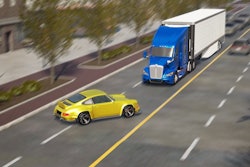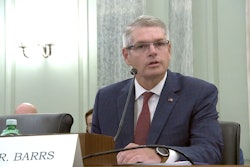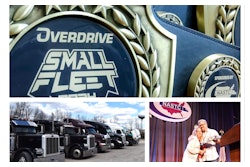ELD tampering has become such a widespread phenomenon that sales agents are cold calling motor carriers offering "ELD editing" and authorities are drafting a new inspections bulletin to combat the "dangerous trend," according to trucking owner-ops and enforcement communities.
Owner-operator Ilya Denisenko recently got a cold call from a company called AVN Logistics Group. Denisenko said it promised "services such as ELDs, dispatching, oversize permits and e-log editing."
Contacted by Overdrive about the last of those services, a rep at AVN first said they could add driving time to a driver's ELD after the driver had run out of hours. Later, however, they insisted the AVN operation was performing strictly legal edits.
Similarly, dispatcher Hector Adrien Esquivel Rodriguez got an unsolicited call from a company called Logbook Hub that advertises on Facebook that it can "FIX your logbook" for $30 a week. Rodriguez posted a video to YouTube that featured him asking this question to the company: "Let's say I don't have any more time, I already used my 14 and my 11, and I need to run one more hour. Can you help?"
"Yes, totally," the voice on the other end of the line responds, saying they have a number drivers can text and a team will edit the logs for them "24/7, no holidays."
According to Rodriguez, "this company damages the industry, and they are a risk for the people on the road."
Rodriguez and Denisenko aren't alone in flagging such out-of-bounds activities. Since the ELD mandate came into play in late 2017, this sort of e-log tampering has grown in prominence so much so that inspectors are contemplating new enforcement mechanisms. The Commercial Vehicle Safety Alliance of law enforcement and industry stakeholders has seen the uptick, and it's ready to act.
Jeremy Disbrow, CVSA's Roadside Inspections Specialist, explained what inspectors are seeing now. "Per the ELD technical specifications, driving time that is detected by the ELD cannot be reassigned to a non-driving duty status," he said. "Additionally, any edits that are made to the record must show they were edited so the edits are identifiable to safety officials. What inspectors are finding with increased frequency are records of duty status (RODS) that are being completely altered with no indication they were edited at all."
This has created a problem for inspectors, as instead of showing a one-time lapse in HOS records, these new entirely fabricated ELD reports show wildly divergent activity.
"In many instances, the ELD entries that are shown to inspectors are inaccurate by hundreds or thousands of miles when compared to verified source documents, such as shipping papers, scale receipts, etc.," said Disbrow. "When entire days or multiple days are completely falsified by manipulating the ELD data, inspectors have no way to identify when the driver was actually driving or resting, making it impossible to determine whether they have their required rest or available driving time."
As Disbrow noted, the Federal Motor Carrier Safety Administration's ELD mandate device specifications in 2017 required that log records can't be edited without evidence of such editing being left behind in a driver's record in the device. Yet FMCSA doesn't actually test the code and hardware for each individual ELD in its device registry, all of which initially self-certified that they follow the rules.
Today, there are more than 1,000 ELD models on FMCSA's device registry.
[Related: Hours edits: Drivers should be in full control with ELDs]
The kinds of tampering described above have become become something of an open secret, according to watchers. Disbrow said when inspectors interview drivers about ELD tampering, some common themes emerge. Here's how he described a typical scenario:
"The motor carrier tells the driver to contact them when they run out of available time to drive," he said. The motor carrier then "contacts a third party who is able to quickly alter the records to eliminate any violations." The scenario lines up with what the Logbook Hub rep told Rodriguez.
In some ways, this kind of thing isn't exactly new. ELD cheating has been around as long as ELDs themselves. Paper logs, too, have long injected a kind of "honor system" into HOS regulations. But this new brand of tampering isn't any kind of honor system, nor is it like ghost logs, where one driver has two ELDs, one under a fake name to look like a co-driver.
Today's problem looks to have industrial scale aided and abetted by businesses purpose-built to help motor carriers evade HOS regulations.
"This type of tampering cannot happen unintentionally. It is not a simple error in a record of duty because a driver accidentally made a mistake," said Disbrow. "This type of tampering is conducted, often by third parties outside of the U.S., on devices that do not meet the technical specifications in the federal regulations."
These third parties are "completely fabricating the record to show a compliant ELD file without any violations, and in many cases, even falsify electronic supporting documents to match the ELD file," which gives inspectors real trouble, he said. As of about a year ago, he added, there had been some "isolated reports of inspectors encountering this type of tampering," yet over the past year, "as inspectors have learned of these techniques, there have been many more instances uncovered across the country."
CVSA has been passing that information around among inspectors, industry and FMCSA "to help minimize the impact of this dangerous trend," he said. CVSA's Driver-Traffic Enforcement Committee "took two important steps to help curtail fatigued driving as a result of ELD tampering." The first step is the new inspection bulletin "that explains the difference between a typical false entry in a record of duty status, such as a driver claiming off-duty time while fueling their vehicle, and an ELD file that has been manipulated."
The second was a CVSA committee vote "to add a section to the North American Out of Service Criteria (OOSC) for ELD tampering," Disbrow added. Currently OOS language for false entries "requires an inspector to prove that the driver would have exceeded the 11, 14, 60 or 70-hour rules at the time of the inspection if the record was not falsified."
That language "will not change," but with the dawn of a new era of ELD tampering, "entire days are often manipulated making it impossible for inspectors to determine when actual driving or rest periods occurred," as noted above. In those instances, "the committee suggested to add an OOS violation to the OOSC which would automatically place the driver OOS until they obtain the required rest."
The change in the OOSC won't come quickly, however. CVSA membership will have a final vote on the topic near the end of the year, and the OOSC is annually updated in April. This year, CVSA made the emergency move to add English language proficiency back to the OOSC by June 25, but Disbrow didn't mention any such effort on the ELD-tampering front. "If it is added to the OOSC, the bulletin," as is usual, "will be released prior to April 1, 2026, to prepare enforcement and industry for the change," said Disbrow.
Disbrow acknowledged that some among Overdrive's readers "will be concerned about a new OOS condition being added," but clarified that "this type of tampering will not be a problem for any carriers that are trying to be compliant. This type of tampering is completely intentional and often requires the carrier to pay a third party to 'scrub' their logs of any violations."
[Related: ELD clarifications: Dual accounts, edits, unidentitied driving]
FMCSA didn't respond to questions about what the agency might be doing in response to CVSA's alerting them to the new trend in ELD tampering, yet FMCSA does semi-regularly remove ELDs from the approved-devices registry. Disbrow said CVSA was "working closely with law enforcement to uncover these tactics and sharing information with FMCSA."
Disbrow also mentioned something of a "revolving door" problem with the bad actors on ELD registry. "FMCSA maintains the list of approved ELDs that have self-certified," he said, yet as FMCSA becomes "aware of non-compliant devices, they conduct investigations and revoke these non-compliant devices when appropriate. Unfortunately, some of these companies start over under a new name and the process repeats itself."
It remains unclear if FMCSA has acted on CVSA-shared information on the tampering issue.
Disbrow concluded with a focus on on bedrock safety outcomes, emphasizing that this type of tampering could open carriers and drivers up to major criminal and civil liabilities, particularly in the event a crash.
"While it may be tempting to tamper with an ELD to gain some extra driving time, the violations that may follow are frankly the least of anyone's concerns," he said. "The larger issue is the criminal and civil liability that will follow in the event of a collision, not to mention the potential injuries or loss of life from the collision. This trend is nothing short of fraud and false information, and the liability to the motor carrier or driver during a lawsuit or criminal trial is a far bigger concern."
[Related: Log-editing 'flexibility' in AOBRD e-logs v. ELDs]








